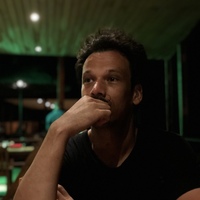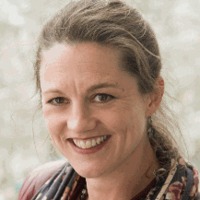Papers by Eric Montgomery

Visual Anthropology, 2017
This article is a photo-essay from a salah Gorovodu ceremony among Anlo-Ewes living in Southern T... more This article is a photo-essay from a salah Gorovodu ceremony among Anlo-Ewes living in Southern Togo. It is a shared ethnographic project employing the photovoice of three subjects and the anthropologist. The experiment was determined, produced and edited by three members of a local shrine and compiled during focus groups and feedback screenings in the summers of 2013-2014. Photo-voice and related shared approaches help to cast more light on a historically misinterpreted religion, "Voodoo," by employing local agency and empowering the subjects to participate in analysis centered on ritual, healing and identity. The Vodu or "Voodoo" religion and peoples have been much maligned by misrepresentations which more collaborative, shared and internal approaches can help rectify. For a filmmaker and cultural anthropologist doing research for the past 16 years in southern Togo, just how to "represent" and frame Vodu ritual and performance has long been a critical question. After making two films in 2012 (Chasing the Spirit and African Herbsmen), my colleague and I realized we had constructed our own "crisis in representation" because, during film feedback screenings and focus groups, it was apparent that there were multiple interpretations and meanings arising from the same social drama. When we returned in 2013 to film, we wanted to use some new techniques to empower the actors themselves, in this case, the Gorovodu and Vodu adherents among the Ewes of southern Togo. We were well-versed in the sensory anthropology literature and were looking for a more holistic method to accompany the diversity and depth of Vodu ritual and ceremony [Geurts 2003; Howes and Classen 2013, 2014; Stoller 1992]. We knew too well there would be no veritable panacea for our representational crisis, but when we stumbled upon photo-voice methodology we felt it would be worth implementing in the field. We collaborated with many of our main contacts from the village, and after some debate the subjects decided we would choose a salah ceremony as our "thick photo description" and "master drama" for our experiment. Armed with cameras and some loose directions, I and three others
An Ethnography of a Vodu Shrine in Southern Togo
This book offers an ethnography of the beliefs and practices of Vodu, as they relate to daily lif... more This book offers an ethnography of the beliefs and practices of Vodu, as they relate to daily life in an ethnic Ewe fishing community on the coast of southern Togo.
An Ethnography of a Vodu Shrine in Southern Togo, 2017
This book offers an ethnography of the beliefs and practices of Vodu, as they relate to daily lif... more This book offers an ethnography of the beliefs and practices of Vodu, as they relate to daily life in an ethnic Ewe fishing community on the coast of southern Togo.
An Ethnography of a Vodu Shrine in Southern Togo
This book offers an ethnography of the beliefs and practices of Vodu, as they relate to daily lif... more This book offers an ethnography of the beliefs and practices of Vodu, as they relate to daily life in an ethnic Ewe fishing community on the coast of southern Togo.

This article is a comparative and ethnographic analysis of syncretism as a theoretical tool for e... more This article is a comparative and ethnographic analysis of syncretism as a theoretical tool for explaining "African-based" religions (Vodu and Orisha) in West Africa and the New World. Vodu and Orisha defy syncretism as a valid concept for explaining the creativity of ritual life because it fails to account for the historicity, the religious imagination, or the cultural context of these forms. This article discusses that despite many shortcomings and problems with syncretism as a concept, it continues to be employed across many disciplines, even as it conflates and mystifies the different aspects and elements of African religions. Syncretism approaches tend to mystify African symbols and explain away things that, from the inside, are fundamental to African systems. This article will explain and contextualize many of these flaws and deficiencies with the concept through fieldwork and archival research.

eTropic: electronic journal of studies in the tropics, 2019
This paper seeks to historicize and demystify “Voodoo” religion in Africa and Haiti while also dr... more This paper seeks to historicize and demystify “Voodoo” religion in Africa and Haiti while also drawing comparisons and contrasts to concepts and themes related to “the gothic”. What is assumed to be “supernatural” or “paranormal” in Western and Gothic circles has long been a part of everyday reality for many peoples of African descent and devotees of Vodun in Western Africa and Vodou in Haiti. Tropes that are essential to realms of the gothic (supernatural characters, mystery, the macabre, spirits, and paranormal entities) — are also central to the cosmology and liturgy of so-called “Voodoo”. As “the gothic” undergoes a resurgence in academic and popular cultures, so too does “Voodoo” religion. And yet, both terms continue to be conflated by popular culture, and by equating “voodoo” with “the gothic”, the true spirt of both concepts become confounded. A certain racialized Eurocentric hegemony devalues one of the world’s least understood religions (“Voodoo”) by equating it with equal...
Revista Brasileira do Caribe, Sep 3, 2021
The privileging of Yoruba and Orisha in the African Diaspora scholarship creates a gap in knowled... more The privileging of Yoruba and Orisha in the African Diaspora scholarship creates a gap in knowledge production involving other African Diaspora religious traditions. Vodun, Vodou, or Voodoo is particularly marginalized and maligned and understudied especially outside of the United States and in places such as Cuba and Brazil. The debates surrounding "authenticity" in African religions been perhaps the biggest debate within Vodun and Orisha on both sides of the Atlantic. These debates speak to the importance of lineage, ancestry, and legitimacy. Sorting out what is authentic and legitimate is often a futile task, one that harmonizes better with Western urges to categorize than it does with African philosophies of embeddedness and continuous change.
Revista Brasileira do Caribe, Sep 3, 2021
The privileging of Yoruba and Orisha in the African Diaspora scholarship creates a gap in knowled... more The privileging of Yoruba and Orisha in the African Diaspora scholarship creates a gap in knowledge production involving other African Diaspora religious traditions. Vodun, Vodou, or Voodoo is particularly marginalized and maligned and understudied especially outside of the United States and in places such as Cuba and Brazil. The debates surrounding "authenticity" in African religions been perhaps the biggest debate within Vodun and Orisha on both sides of the Atlantic. These debates speak to the importance of lineage, ancestry, and legitimacy. Sorting out what is authentic and legitimate is often a futile task, one that harmonizes better with Western urges to categorize than it does with African philosophies of embeddedness and continuous change.
African Studies Review, 2020
An Ethnography of a Vodu Shrine in Southern Togo
This book offers an ethnography of the beliefs and practices of Vodu, as they relate to daily lif... more This book offers an ethnography of the beliefs and practices of Vodu, as they relate to daily life in an ethnic Ewe fishing community on the coast of southern Togo.









Uploads
Papers by Eric Montgomery